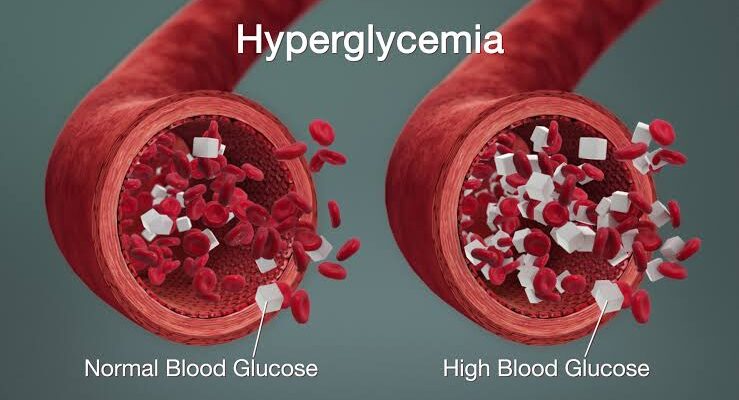Overview
Hyperglycemia, or high blood glucose levels, commonly affects individuals with diabetes but can also occur in people without diabetes under certain conditions. Left untreated, hyperglycemia can lead to severe complications, including nerve, kidney, and cardiovascular damage. Managing hyperglycemia is essential for preventing these risks and promoting overall health.
Treatment for hyperglycemia typically focuses on restoring blood glucose levels to a healthy range and preventing future spikes. For individuals with diabetes, this often involves adjusting insulin or other medication dosages, monitoring blood sugar levels regularly, and making lifestyle changes such as following a balanced diet, exercising, and managing stress. In some cases, people without diabetes may also experience hyperglycemia due to stress, illness, or medications, and they may need temporary interventions.
For effective long-term management, individuals with recurring hyperglycemia benefit from working closely with healthcare providers to tailor a treatment plan that fits their needs. Proactive lifestyle adjustments and regular check-ups can play a significant role in maintaining stable blood sugar levels and reducing the risk of complications.
Table of Contents
When to See a Doctor
If you experience symptoms of hyperglycemia, it’s important to recognize when to seek medical advice. Prompt evaluation and intervention can prevent complications and help you manage blood sugar levels effectively.
Consider seeing a doctor if:
- Frequent or persistent high blood sugar levels. If your blood glucose readings are consistently above your target range, this may indicate that your current treatment plan needs adjustment.
- Unexplained weight loss. Significant or rapid weight loss can be a sign of unmanaged high blood sugar and may require medical evaluation to prevent further health complications.
- Increased thirst and urination. These are common signs of hyperglycemia, and if they persist, they could indicate that your blood sugar levels are too high.
- Blurred vision or fatigue. If you experience ongoing fatigue or vision changes, it may be related to high blood sugar levels, which should be assessed by a healthcare provider.
- Nausea, vomiting, or abdominal pain. These symptoms may indicate diabetic ketoacidosis (DKA), a serious condition that requires immediate medical attention. DKA is more common in people with type 1 diabetes but can also occur in those with type 2 diabetes during severe hyperglycemia episodes.
What Type of Doctor to Seek
A primary care physician can provide initial assessment and guidance for hyperglycemia management, especially if symptoms are mild. For individuals with diabetes, an endocrinologist (a specialist in hormone-related conditions, including diabetes) can offer more targeted care and help adjust medications or insulin regimens as needed.
What to Expect from Your Visit to a Doctor
During your visit, the doctor will likely review your medical history, daily blood sugar readings (if available), and any recent changes in symptoms. They may conduct blood tests, such as HbA1c, to assess long-term blood glucose control and to identify potential causes of elevated blood sugar.
The doctor may suggest one or more of the following:
- Adjusting your treatment plan. This might involve changes in your medication, insulin dosage, or other aspects of your diabetes management.
- Dietary and lifestyle recommendations. Your doctor may advise you on meal planning, physical activity, and stress management techniques to help maintain stable blood sugar levels.
- Regular follow-up appointments. For ongoing management, follow-ups may be scheduled to monitor progress and make necessary adjustments.
Seeking medical attention can help prevent complications and improve long-term management of hyperglycemia. Working closely with a healthcare provider is essential for developing a personalized treatment plan that fits your lifestyle and health needs.
Hyperglycemia Treatment Options

Image Source: www.freepik.com
Hyperglycemia that is not caused by a chronic condition like diabetes can often be managed through healthy lifestyle changes. For such cases, the following treatments can help bring blood sugar levels back to a normal range:
- Exercise. Physical activity can lower blood sugar levels by helping muscles use glucose (sugar) and triggering insulin utilization. Exercise prompts the muscles to absorb glucose from the bloodstream, reducing blood sugar levels. However, if blood sugar levels exceed 240 mg/dl, exercise is generally discouraged. At such high levels, the body may produce ketones—byproducts created by the liver from fat. When insulin levels are insufficient, the body uses ketones as an alternative energy source, which can be harmful. Exercising with ketones in the body can lead to blood poisoning and may further elevate blood sugar. Testing for ketones in the urine is recommended if levels are high, and waiting until they normalize before exercising is safer.
- Dietary changes. Alongside exercise, diet modification is an effective way to manage hyperglycemia. It is advised to eat smaller portions and avoid sugary drinks and high-sugar foods. Reducing the frequency of snacks between meals is also beneficial. If sticking to a diet plan is challenging, consulting a dietician can provide personalized guidance and support to achieve a healthier diet that manages blood sugar effectively.
- Hydration. Drinking plenty of water is another effective way to reduce blood sugar levels. Adequate hydration helps the kidneys flush excess glucose out of the body through urine, supporting blood sugar regulation naturally.
- Oral insulin medications or insulin injections. For significantly elevated blood sugar levels, doctors may prescribe oral insulin medications or insulin injections. Before taking insulin, it’s crucial to check blood sugar levels to determine the appropriate dosage. Many pharmacies carry glucose monitoring devices, allowing patients to monitor their blood sugar at home. A nurse or doctor can guide patients on how to use the device accurately and how to properly administer insulin injections if necessary.
By adopting these healthy lifestyle practices, most cases of temporary hyperglycemia can be managed effectively. For severe or persistent cases, seeking medical advice ensures proper dosage and timing of insulin or other medications, contributing to better blood sugar control and overall health.
Hyperglycemia Prognosis
The prognosis for hyperglycemia largely depends on timely intervention and effective management. For individuals with diabetes, successfully managing hyperglycemia can reduce the risk of complications, improve quality of life, and support long-term health. When left untreated, however, persistent hyperglycemia can lead to severe complications, including cardiovascular disease, kidney damage, neuropathy, and vision impairment.
Factors influencing the prognosis include:
- Timely diagnosis and treatment. Early identification and management of hyperglycemia can prevent complications and allow individuals to maintain stable blood glucose levels, particularly important for those newly diagnosed with diabetes.
- Adherence to treatment and lifestyle changes. For individuals with diabetes, consistent use of medications, insulin (if prescribed), regular monitoring, and adopting a healthy diet and exercise routine are essential for maintaining good blood sugar control and preventing health issues.
- Management of additional health conditions. Conditions such as high blood pressure, high cholesterol, and obesity can worsen the effects of hyperglycemia. Treating these conditions alongside diabetes can improve the overall prognosis.
- Access to healthcare and regular follow-up. Ongoing check-ups with healthcare providers allow for timely adjustments to treatment, monitoring of long-term blood glucose levels, and guidance on lifestyle changes, all of which are crucial for optimal blood sugar control.
With proactive care, many individuals can effectively manage hyperglycemia and reduce their risk of complications. Working closely with healthcare professionals and committing to a personalized management plan can help maintain stable blood sugar levels and improve overall health, providing a positive outlook for individuals with hyperglycemia.


